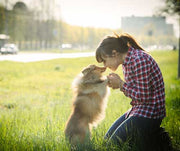A Brief Guide to Adopting a Senior Dog

When most people think about getting a new dog, they picture a playful puppy. But there's a special group of four-legged friends often overlooked at shelters – senior dogs. These gentle souls, typically aged 7 and up, can make wonderful pets and deserve a second chance at a loving home.
Many local shelters are full of older dogs who have ended up there for various reasons – their previous owners moved, passed away, or simply couldn't care for them anymore. While younger dogs get picked quickly, senior pets often wait longer for their forever homes.
But here's the thing – adopting an older dog can be a great choice for many families. Unlike puppies who need constant training and attention, most senior dogs already know the basics. They're usually house-trained, understand commands, and have settled personalities. This makes them perfect for first-time pet parents or those who want a more laid-back companion.
By choosing to adopt a senior dog, you're not just getting a pet – you're giving a deserving animal a chance to spend their golden years as a cherished family member. This guide will walk you through what to expect, how to prepare, and why bringing home an older dog might be the best decision you'll ever make.
Advantages of Senior Dog Adoption

Bringing a senior dog home can be a rewarding choice for pet parents. While puppies often steal the spotlight, older dogs offer unique benefits that make them great companions. Here's why adopting a senior pet might be the right choice for you:
Calmer Energy Levels
Senior dogs typically need less exercise than younger dogs. They're happy with short walks and quiet time, making them perfect for:
- Relaxed lifestyles
- Apartment living
- Families with small children
- Older adults
Known Personalities
With senior dogs, what you see is what you get. They have:
- Set behaviors and habits
- Clear temperaments
- Known size and grooming needs
This makes matching a senior dog to your lifestyle much easier than guessing how a puppy might turn out.
Often Already Trained
Many senior dogs come with built-in manners. They usually:
- Know basic commands
- Are house-trained
- Understand "indoor voice"
- Have leash skills
This saves you time and energy on training basics.
Great for First-Time Pet Parents
Senior dogs can be ideal for new dog owners because:
- They're less demanding
- They have predictable routines
- They're often content with simple activities
Health Clarity
When adopting from a shelter, senior dogs usually come with the following:
- Known medical history
- Established care routines
- Clear health needs
This helps you plan for their care and avoid surprises.
Immediate Companionship
Unlike puppies who need constant training, senior dogs can settle into companionship quickly:
- Ready for family life
- Able to adapt to new surroundings
- Often good with other pets
You're Saving a Life
Senior dogs in shelters often get overlooked. By choosing an older pet:
- You give them a second chance
- You open space for other animals in need
- You show that love has no age limit
The Challenges of Adopting Senior Dogs

Bringing a senior dog home presents unique situations that new pet parents should be aware of. While older dogs make great companions, they need special care as they adjust to their new surroundings.
Health Concerns
Senior dogs often need more medical care than younger dogs. They may have:
- Joint pain that limits movement
- Vision loss
- Kidney disease
- Dental problems
Regular vet check-ups help catch health issues early. Many older dogs need daily medicine or joint supplements, and some might need wet food if they have trouble chewing.
Adjustment Period
Senior dogs take time to feel at home. They may:
- Feel confused in new surroundings
- Miss their previous home
- Show stress through excessive barking
- Have accidents while learning the new routine
Give your new family member a quiet place to rest. Short walks and a soft bed help them feel safe. Be patient - most dogs settle in within a few weeks.
Special Care Needs
Older pets often need:
- More frequent bathroom breaks
- Help with stairs or getting into cars
- Regular grooming
- A set daily routine
Some senior dogs might not play as much as puppies. They make up for it by being calm and loving companions.
Senior Dog Training Differences
While old dogs can learn new tricks, they need:
- Positive reinforcement
- Short training sessions
- Simple commands
- Patience with new behaviors
Many older dogs already know basic commands, making training easier.
home environment, overall health, etc.
Tip to Pet Parents for their Newly Adopted Senior Dog

Bringing home a senior dog is a special experience. Unlike younger dogs, older pups may need more time to adjust to a new environment, but with patience and the right approach, you can help your aging dog settle in comfortably.
Create a Cozy Space
Setting up a safe and cozy spot for your new senior dog is key. A soft orthopedic bed is a great choice. It provides extra support for older joints, making it easier for your dog to relax and sleep soundly. Consider placing it in a quiet area away from heavy foot traffic to give your dog a sense of security.
Use Elevated Bowls for Comfort
Senior dogs may have neck or joint issues that make bending down to eat and drink uncomfortable. Switching to elevated bowls, like the elevated dog feeder, can reduce strain and encourage better posture during mealtime. This small change can make a big difference for dogs with arthritis or other health problems.
Introduce Them Gradually to Other Dogs
If you have other dogs, introduce them slowly. Give each dog its own space and supervise early interactions to prevent stress. Exercise pens can help establish boundaries while allowing safe interaction. This gradual approach will help build positive relationships over time.
Encourage Gentle Playtime
While your old dog may not be as active as a puppy, light playtime is still beneficial. Soft toys, like plush toys, are ideal because they are easy on aging teeth and provide mental stimulation. Short, gentle games can help keep your dog engaged without overexertion.
Provide Easy Access to Food and Water
Make sure food and water are easy to access. Placing them on a no-skid dog food mat will prevent accidents and help your dog eat comfortably. This is especially important if your senior dog has mobility issues.
Help Your Dog Navigate Its New Environment
Senior dogs may have vision or hearing impairments that can make a new environment feel overwhelming. Help them navigate by using rugs or mats to create clear paths. Petmate’s Kennel Pads can also serve as guide markers around the house, giving your dog a sense of direction and security.
Adopting a senior dog can be deeply rewarding. With the right setup and a little extra care, your new pet can thrive in their golden years. Use these senior dog tips to make the transition smoother and ensure your furry friend feels loved and supported in their new home.
Ensuring Comfort and Happiness for Your Senior Dog
Adopting a senior dog is a rewarding experience that brings a new kind of companionship into your life. Older dogs may not have the same energy as younger dogs, but they offer a gentle and loyal presence that can quickly become a cherished part of the family. By taking the time to create a welcoming new environment, you help your aging dog feel safe and loved.
Remember, senior dogs may need more patience and care. However, with the proper attention to their health problems, dietary needs, and comfort, they can continue to thrive and enjoy their golden years. To support this, Petmate offers a range of products designed specifically for senior dogs and their unique needs.
For example, cozy beds that support aging joints can make a world of difference in their daily comfort, while easy-access feeders ensure they can enjoy mealtimes without unnecessary strain. By having the right tools on hand, you’ll be better equipped to help your senior pet adjust to these changes and maintain a high quality of life.
Ready to start searching? We've partnered with Adopt-a-pet.com to help potential pet parents find the right dog or cat for them! Click HERE to get started! Your perfect furry friend might just be waiting for a loving home.
Previous article

Next article

Related posts
View all-

Holiday Gifts for Every Pet Personality: The Ultimate Guide
The holiday season is finally here, and for many of us, that means finding the perfect presents for the ones we love most—our pets. Whether they are a steadfast dog who never leaves your side or an independent cat who graces you with their presence on their own terms, our pets are cherished members of the family. They deserve to celebrate right alongside us, stocking stuffers and all.
Read Article -

How to Keep Your Pet Calm During Thanksgiving
Thanksgiving is a time for family, friends, and food, but for our pets, the holiday can be overwhelming. The sudden change in routine, unfamiliar faces and scents, and increased noise can trigger significant stress. Understanding why your pet might feel anxious is the first step toward creating a peaceful holiday experience for everyone, including your furry family members. This guide offers calming tips for pets and practical solutions to ensure your dog or cat feels safe and secure during the festivities.
Read Article -

Top Travel Essentials for Pets This Holiday Season
Holiday travel often means bringing the whole family along, and for many of us, that includes our furry companions. Preparing for holiday pet travel is about more than just packing a bag; it's about ensuring your pet's safety, comfort, and happiness from the moment you leave home until you return. A little planning helps reduce stress for both you and your pet, making the journey a positive experience for everyone involved.
Read Article



